**Disclaimer: sensitive content warning – references of childhood trauma, sexual trauma, suicide
Therapy dogs, like Chipper and Luna, play a crucial role in providing a calming presence and comforting support during high stress situations. Along with their UCF Police Department handlers, Detective Bianca Becker and Detective Missy Guadagnino, these furry companions support the department’s daily needs in numerous ways. The therapy dogs console trauma survivors, engage in community events like “Coffee with a Cop,” and act as a friendly link between the public and law enforcement. The gentle nature of Chipper and Luna helps ease tension and build connections, especially for those who may find uniformed officers intimidating.
That’s not all though – Chipper and Luna go beyond community outreach and also offer emotional support to the department’s personnel. They assist dispatchers during high-stress situations and provide officers with moments of respite, which is essential for the team’s well-being and performance. Their presence promotes a positive atmosphere and aids in prioritizing mental wellness within the department. That’s why we’re excited to share this interview with you today, featuring our Beyond the Leash graduates and their handlers to share more about these two special pups!
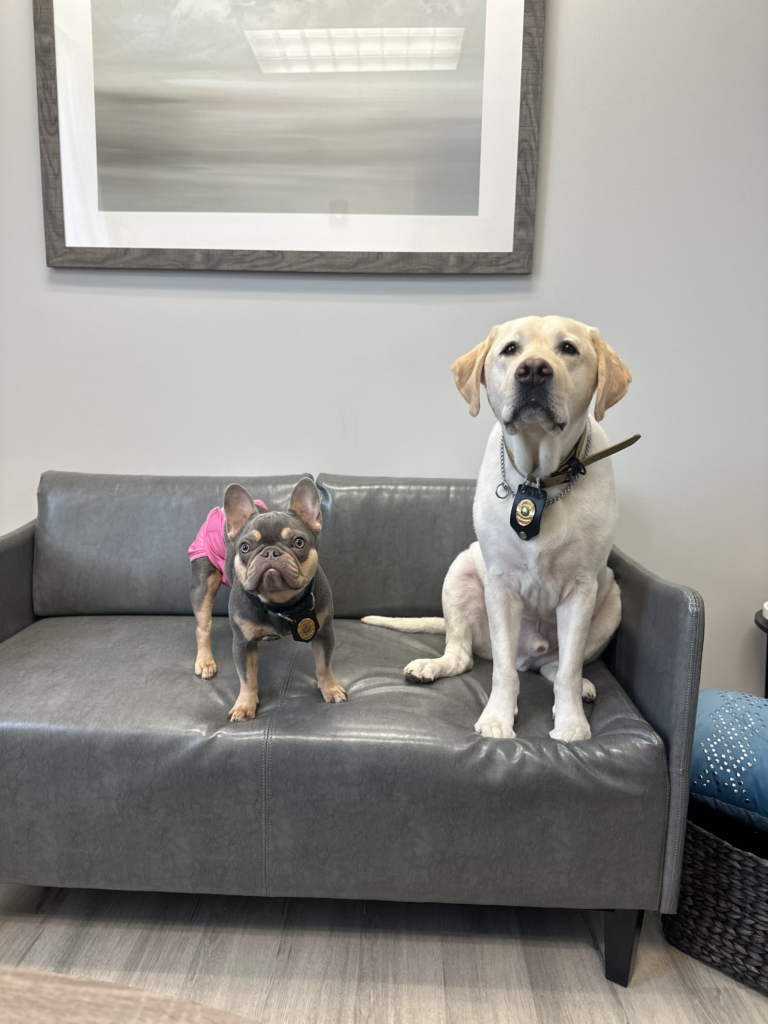
What does a typical day look like in the life of Chipper and Luna?
Det. Bianca Becker: It varies and depends on the circumstances. When campus gets busier or when cases arise, we coordinate and decide which dog is the best fit for the situation. We then bring them to our soft interview room and utilize the dogs for victims who have experienced trauma. We assess which dog – whether a larger dog like Chipper or smaller one like Luna – is more suitable and always weigh the pros and cons. If there are no ongoing meetings with victims, we engage the dogs in various community events. They assist in coffee gatherings and other outreach initiatives, helping students and faculty members feel at ease, especially those who find uniforms intimidating.
Det. Missy Guadagnino: Once they see the dogs, everyone just wants to say hello! Chipper and Luna assist us in these interactions and we receive requests for them regularly. For instance, we had an event on Valentine’s Day where Chipper and Luna were requested, as well as another event the following week for a student organization.
They are highly sought after and are utilized multiple times a week, particularly during busy periods like finals week or midterms. Various organizations, housing complexes, and the student government frequently request their presence for events. The frequency of their appearances depends on our workload. If we are overwhelmed with cases, we may need to limit their involvement in events. As things stabilize, they are available for use again based on the demand.
That’s absolutely amazing! We can tell Chipper and Luna have represented UCF PD very well and done an incredible job together! What kinds of training do they have to serve in their roles?
Missy: For Chipper, he was already fully trained and then placed with us. We previously had a therapy dog that retired, and then I pitched that Beyond the Leash has this great dog that could be a perfect fit for UCF PD. So Kim Bissing (Owner of Beyond the Leash) brought Chipper for a home visit and the kids immediately loved him! Then Chipper came for a visit at UCF PD and everyone was obsessed with him! So at that point, he’s a hundred percent trained – now it’s time for ME to get trained to work with him. We did the obedience classes at Beyond the Leash, all the way through the advanced and Therapy Dog training class. We did everything that you would do in the normal training classes, but it was more about training me and learning how to work with him.
I was very lucky in the fact that Chipper was already fully trained, unlike Luna who Bianca is having to start from the ground up! I give Bianca a lot of credit, because she is putting in a lot of work with training Luna not just on the weekdays, but also on the weekends.
Bianca: I knew it was going to be a lot with the training certifications because she’s a puppy and we’re still training her! On top of that, having a baby at home, going to training classes on weekends, working my full-time job – it’s been a lot to manage!
But whenever I see her do her thing, it’s really amazing because she turns into a completely different dog. It’s funny to see her crazy goofy side, and then to actually see her just fall asleep in people’s laps – it makes it all worth it. But I would definitely love to do this again, but I want to do it Missy’s way, where you’re not having to train yourself AND the dog at the same time!
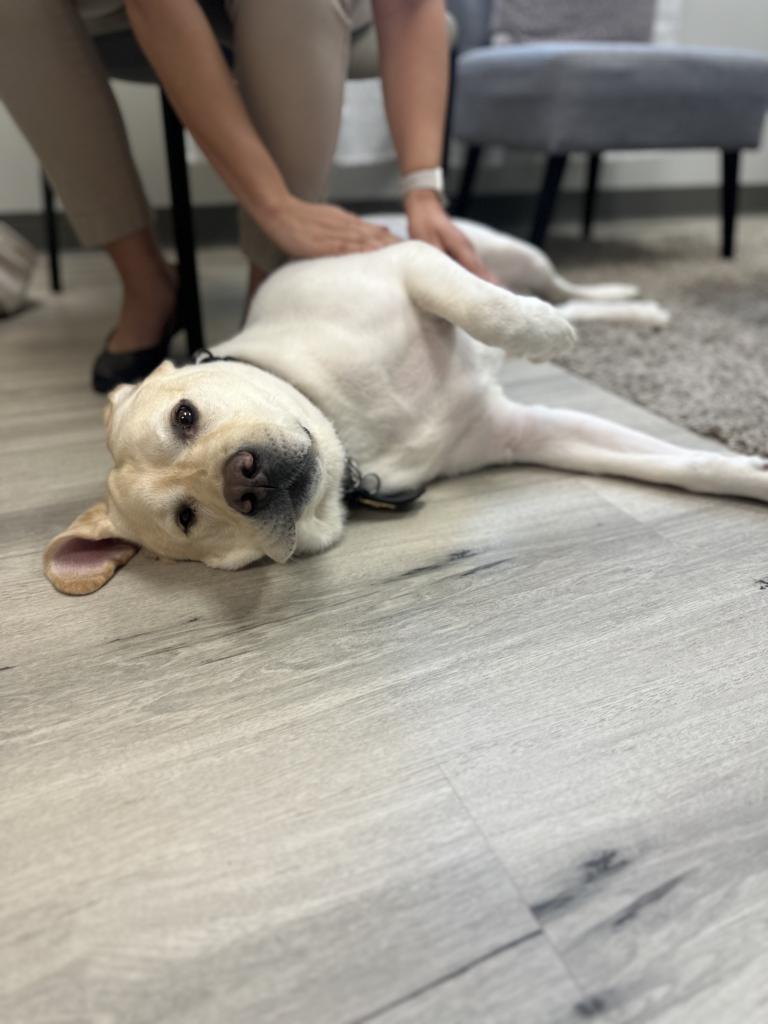
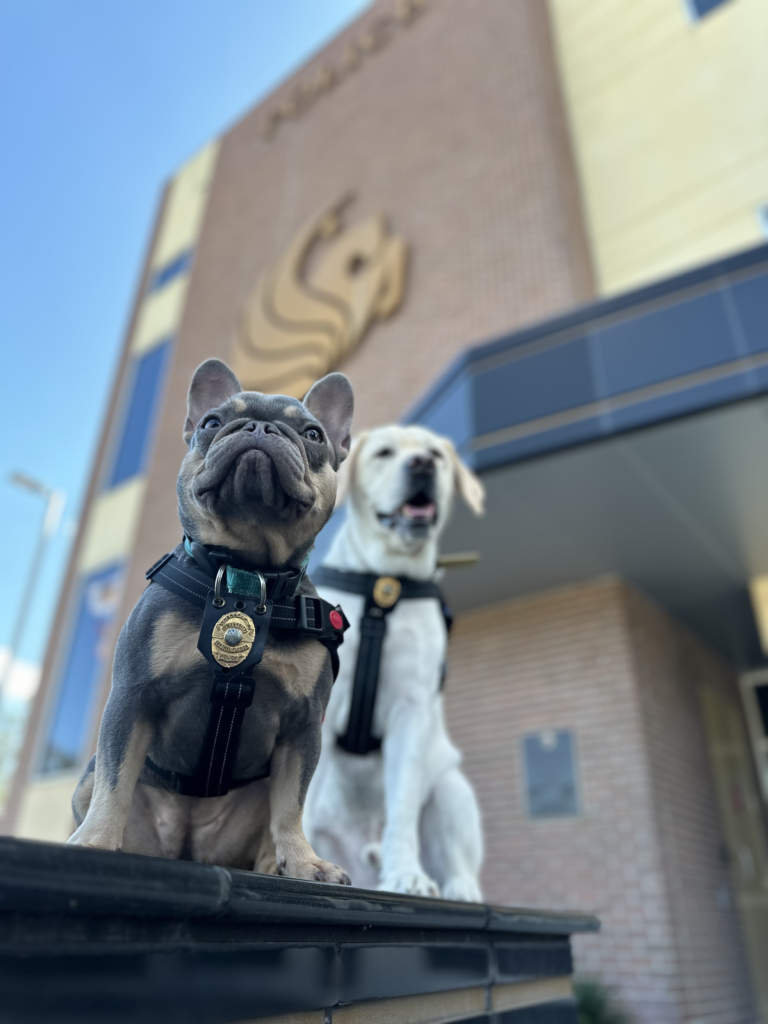
You all have definitely put in a lot of hard work to do what you do! I would imagine that, like us, it’s helpful for the dogs to have some kind of structure to their days – so what kind of morning routine or evening wind down do the dogs have as part of their day?
Missy: We typically start our day taking Chipper for a walk and then get the kids ready for school and they like to load him up in the car. Once we’re at work, he tends to wander around, checking in on everyone at their desks before we start our calls or attend events on campus. In the evening, the routine is similar – he comes home with us, plays with the kids, and we go for a long walk around the block. Sometimes he sleeps with the kids, but most of the time, I put him in his crate. When it’s time for work, I put on his leash, and he knows it’s time to focus. If your dog follows these routines, it’s easier. When it’s time to work, they understand the routine, especially when they see us preparing with leashes and backpacks.
Bianca: It’s just different because Luna is still young, and we are still working on her development – unlike Chipper who was fully trained and ready to go as soon as he got placed here. Since we first got Luna at three and a half months old, she has made significant progress. She enjoys more structured play times in the mornings, and sometimes she chases Chipper around at the office! In the afternoons, we typically go for a walk, but this can vary based on our schedules. If she ends up in her crate for most of the afternoon, I make sure she gets a long walk and playtime with my other dogs when I get home. Our routine is quite flexible and definitely depends on our workload!
It sounds like Chipper and Luna have a lot of different roles supporting a lot of different people! Since they are considered part of your staff, do they also offer support to your coworkers?
Bianca: Yes! We have staff regularly stop by to receive their daily pet therapy. We often get requests to the dispatch center since they are unable to leave their posts as calls keep coming in. We usually can find some time to visit when they request to bring the dogs down for a short time. Even our Chief comes to spend time with the dogs when he’s had a tough day!
Missy: Our Deputy Chief is obsessed with them! I’ll sometimes let Chipper take the lead and he will head straight into her office sometimes. It just seems to help our command staff, officers, and everybody to have that brief reminder to take a moment and relax a bit.
Bianca: Even our civilians – you wouldn’t expect our records and evidence technicians who spend most of their time buried in paperwork, but they’re also dealing with people who are frustrated saying or yelling things like, “I want my stuff back; What do you mean I can’t have my bag?!” Sometimes the people you would never think of come up here whenever they have breaks in their day. They’ll come up and say, “I just need some time with [Chipper or Luna].”
Do you have a moment that stands out for you while you’ve been working with Chipper and Luna?
Bianca: I think what’s really cool is our program supports a lot of the other departments. And even the other departments that we see in where they have their own therapy dogs, they don’t always have access to them. Because Orange County is huge, I know it’s hard for them to have therapy dogs readily available since they typically have to put in a request and then work out the schedule – it can just get very complicated. So Chipper and Luna have both been used on child sex crimes cases by the state attorney’s office and it’s actually really cool to support other departments and how they work.
Missy: I had a few experiences that really stuck out to me. Orlando PD requested Chipper for a case, and when we arrived, we sat for three hours with a young boy – probably around 13 years old – who had lost his dog and was so excited to see Chipper. As soon as he saw Chipper, the boy’s face lit up – he looked so happy! He spent three hours just petting Chipper, and then started opening up saying things like, “I miss my dog.” The detectives were impressed by how much he shared during this interaction compared to previous weeks where he hardly said anything. After our visit, this boy kept saying how much he enjoyed spending time with Chipper!
Another incident involved a suicide, and Chipper was able to bring comfort to the person’s friends and family. Witnessing how during such a tragic time, the kids could still find some joy and comfort as they interacted with Chipper. We’re so lucky to have this team that brings the dogs to support those who have gone through traumatic experiences, and seeing the positive impact these dogs have on everyone involved is amazing.
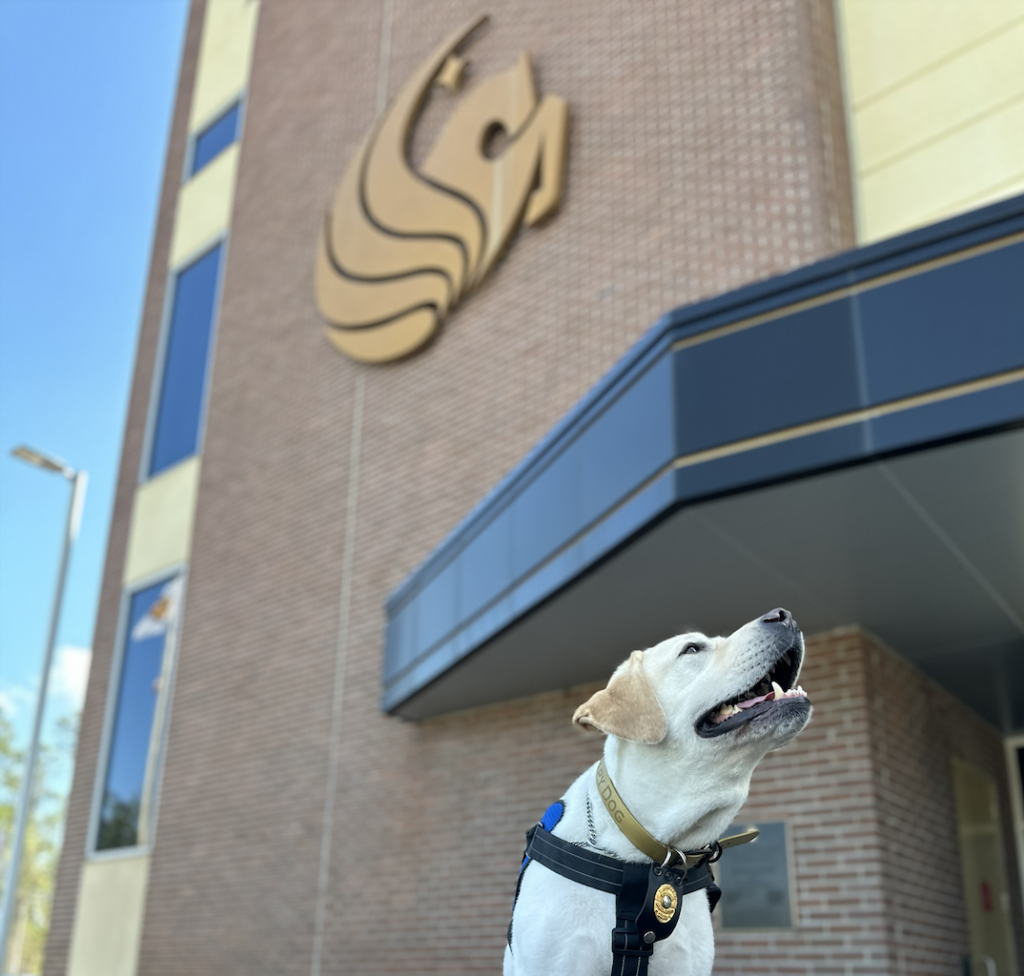
Bianca: So I think my favorite one was the first one that Luna was used for, for the State Attorney’s office. The girl was, I think, eight or nine at the time. She was raped, threatened – a completely horrific situation in general. She was 13 when her case was going to trial, and so she said to her child protection team, “I like dogs, but only small dogs.” So they brought Luna in for her trial prep and understandably this girl didn’t want to talk and was very quiet, very shutdown. She had an hour and a half with Luna and it was amazing to see her come out of her shell. We ended up staying for the whole time they prepped her for trial and Luna was just in her lap and slept the entire time! And you could see the girl stress petting Luna while she spoke, and I just didn’t expect that.
And so whenever we were done with it, they asked her, “Do you have any questions about the process or anything?” And she just turned to me and she said, “Are you guys going to be [at the trial]?” So of course the answer was yes, and our plan was to have Luna there right before the girl testified. The way that trial goes is they’ll bring all the witnesses in and swear them in at the beginning, and then they’re supposed to leave. And when the girl went to swear in, she broke down crying and they had to take a recess and to get her out of the courtroom. She was so distressed they couldn’t even work her in, so she saw Luna for two hours and it was like the girl was a different person by the end of that time. And that’s something that I understood the science behind, but that was the first time I got to see witness it in person and it was just really great experience to be a part of.
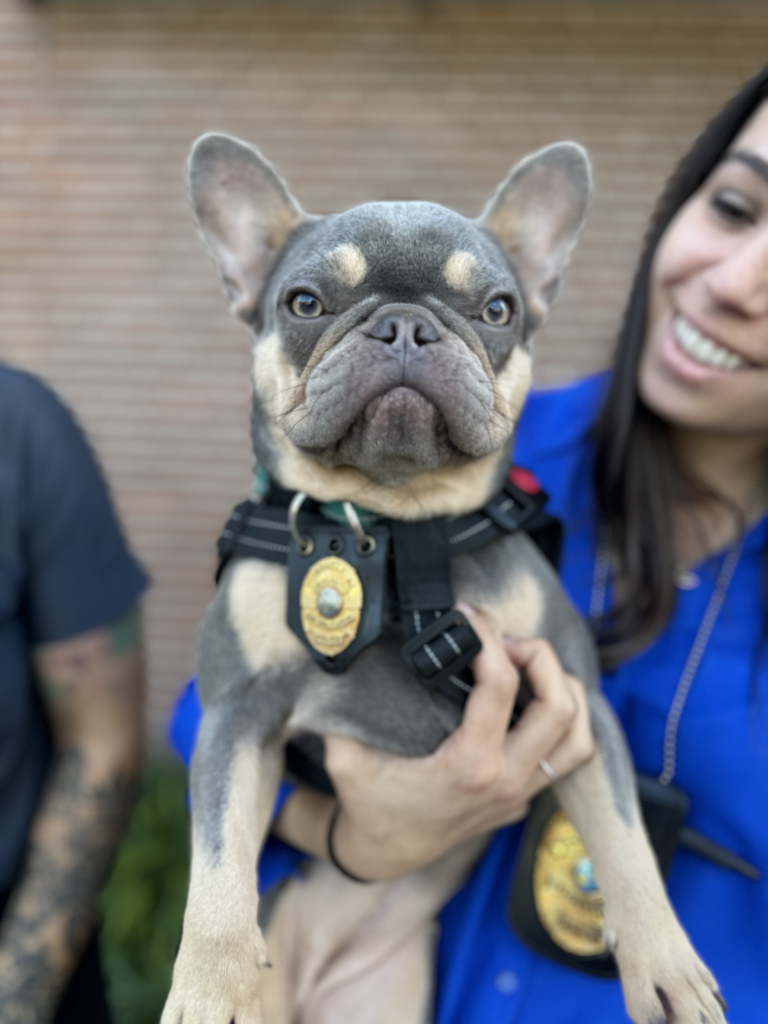
Missy: Just like any victim that comes in here that’s super stressed out. Especially victims that are in distress and coming here, they’re nervous because 1) they’re in a police department and 2) they’re dealing with badges and guns and all that right after they’ve just had this traumatic experience. So being able to let them sit with the dogs for a little bit, you can just see the demeanor change from being super nervous and thinking, “I don’t want to be here,” to calming down and taking a deep breath. We actually have videos of one girl literally sleeping next to Chipper on the couch after her interview – I think everything just caught up to her and she felt safe.
Bianca: That girl came in and she was so stressed out. She almost couldn’t talk, and she wouldn’t open up. And so Missy went to download her phone for evidence and she goes, “Just hang out here with Chipper for a second, I’ll be right back.” We were keeping an eye on the camera and the girl literally fell asleep. That was one of the first times we saw Chipper do his thing as all of us were watching and then he got up on the couch and just knew how to comfort her.
Missy: We usually can tell if they’re a dog person or not, so sometimes we walk out and let them have that moment where we’re not in here, staring at them the whole time. So at that moment I could tell she wanted to pet Chipper, but we’re very obviously intimidating, too, as we’re sitting here.
What’s your favorite part about working with Chipper and Luna?
Bianca: Everyone wants to talk to us now! When people notice the uniform badge or the uniform, it can sometimes put them off. Now that we have the dogs with us, people are drawn to the dogs and see the dogs wearing their badges too! This simple change has made a big difference. By engaging with people and inviting them to interact with the dogs, it helps create a more welcoming environment. Surprisingly, these interactions often lead to unexpected personal disclosures. For instance, I once met a young woman who had experienced the Marjorie Stoneman Douglas shooting. When she learned that Luna was a therapy dog in training, she opened up about her experience during the tragedy. Other people have shared stories of childhood trauma while they are visiting with the dogs, showing that these conversations can go deep beyond just casual interactions with the comfort provided by the dogs. These kinds of encounters have been really powerful and eye-opening, and allow us to potentially share resources to help if they’re struggling or in crisis.
Missy: Yeah, I think it’s just meeting the people and it’s funny when people come to see the dogs than to actually talk with us, but it gives us that means to be able to communicate with them. We would have people in the beginning – when I first got him – come to PD and ask, “Can we see Chipper? I don’t know the detective’s name…but can we see Chipper?!” And just being able to hang out with the dogs all day. It’s like the best thing ever. When we’re stressed at work, it’s great to have the dogs around, too. The best part is being able to pet them whenever we need some relaxation after a really tough case. Being able to work that case where you’re just a mess and crying, and then I was able to just sit with Chipper for a minute. It was just like, “Okay, this is what I needed.” So it’s good for us, and just having them around is the best part!
Thank you both so much for sharing your time with us so we can get to know Chipper and Luna!
In wrapping up this conversation, it’s clear that the UCF PD therapy dogs, Chipper and Luna, are making an impact far beyond just their immediate duties. The bond between these furry heroes and their handlers, Missy and Bianca, is undeniably strong and the positive effects ripple out to the greater Orlando community! From providing comfort to victims and their own law enforcement colleagues to becoming an important part of the overall outreach program, Chipper and Luna are an extremely valuable extension of UCF PD. Their stories are powerful examples of the importance of the human-animal bond, and how their presence can provide comfort and support during challenging times. We are so grateful to be part of their story and we appreciate the work that Chipper & Missy, Luna & Bianca do on a daily basis!
**If you’d like to donate to the UCF Police Department K-9 Fund to support the pet therapy teams, please click here!
**If you’d like to donate to the Beyond the Leash Foundation to support the training and placement of pet therapy teams like Luna and Chipper, please click here!
**Disclaimer: sensitive content warning – references of childhood trauma, sexual trauma, suicide
Therapy dogs, like Chipper and Luna, play a crucial role in providing a calming presence and comforting support during high stress situations. Along with their UCF Police Department handlers, Detective Bianca Becker and Detective Missy Guadagnino, these furry companions support the department’s daily needs in numerous ways. The therapy dogs console trauma survivors, engage in community events like “Coffee with a Cop,” and act as a friendly link between the public and law enforcement. The gentle nature of Chipper and Luna helps ease tension and build connections, especially for those who may find uniformed officers intimidating.
That’s not all though – Chipper and Luna go beyond community outreach and also offer emotional support to the department’s personnel. They assist dispatchers during high-stress situations and provide officers with moments of respite, which is essential for the team’s well-being and performance. Their presence promotes a positive atmosphere and aids in prioritizing mental wellness within the department. That’s why we’re excited to share this interview with you today, featuring our Beyond the Leash graduates and their handlers to share more about these two special pups!

What does a typical day look like in the life of Chipper and Luna?
Det. Bianca Becker: It varies and depends on the circumstances. When campus gets busier or when cases arise, we coordinate and decide which dog is the best fit for the situation. We then bring them to our soft interview room and utilize the dogs for victims who have experienced trauma. We assess which dog – whether a larger dog like Chipper or smaller one like Luna – is more suitable and always weigh the pros and cons. If there are no ongoing meetings with victims, we engage the dogs in various community events. They assist in coffee gatherings and other outreach initiatives, helping students and faculty members feel at ease, especially those who find uniforms intimidating.
Det. Missy Guadagnino: Once they see the dogs, everyone just wants to say hello! Chipper and Luna assist us in these interactions and we receive requests for them regularly. For instance, we had an event on Valentine’s Day where Chipper and Luna were requested, as well as another event the following week for a student organization.
They are highly sought after and are utilized multiple times a week, particularly during busy periods like finals week or midterms. Various organizations, housing complexes, and the student government frequently request their presence for events. The frequency of their appearances depends on our workload. If we are overwhelmed with cases, we may need to limit their involvement in events. As things stabilize, they are available for use again based on the demand.
That’s absolutely amazing! We can tell Chipper and Luna have represented UCF PD very well and done an incredible job together! What kinds of training do they have to serve in their roles?
Missy: For Chipper, he was already fully trained and then placed with us. We previously had a therapy dog that retired, and then I pitched that Beyond the Leash has this great dog that could be a perfect fit for UCF PD. So Kim Bissing (Owner of Beyond the Leash) brought Chipper for a home visit and the kids immediately loved him! Then Chipper came for a visit at UCF PD and everyone was obsessed with him! So at that point, he’s a hundred percent trained – now it’s time for ME to get trained to work with him. We did the obedience classes at Beyond the Leash, all the way through the advanced and Therapy Dog training class. We did everything that you would do in the normal training classes, but it was more about training me and learning how to work with him.
I was very lucky in the fact that Chipper was already fully trained, unlike Luna who Bianca is having to start from the ground up! I give Bianca a lot of credit, because she is putting in a lot of work with training Luna not just on the weekdays, but also on the weekends.
Bianca: I knew it was going to be a lot with the training certifications because she’s a puppy and we’re still training her! On top of that, having a baby at home, going to training classes on weekends, working my full-time job – it’s been a lot to manage!
But whenever I see her do her thing, it’s really amazing because she turns into a completely different dog. It’s funny to see her crazy goofy side, and then to actually see her just fall asleep in people’s laps – it makes it all worth it. But I would definitely love to do this again, but I want to do it Missy’s way, where you’re not having to train yourself AND the dog at the same time!


You all have definitely put in a lot of hard work to do what you do! I would imagine that, like us, it’s helpful for the dogs to have some kind of structure to their days – so what kind of morning routine or evening wind down do the dogs have as part of their day?
Missy: We typically start our day taking Chipper for a walk and then get the kids ready for school and they like to load him up in the car. Once we’re at work, he tends to wander around, checking in on everyone at their desks before we start our calls or attend events on campus. In the evening, the routine is similar – he comes home with us, plays with the kids, and we go for a long walk around the block. Sometimes he sleeps with the kids, but most of the time, I put him in his crate. When it’s time for work, I put on his leash, and he knows it’s time to focus. If your dog follows these routines, it’s easier. When it’s time to work, they understand the routine, especially when they see us preparing with leashes and backpacks.
Bianca: It’s just different because Luna is still young, and we are still working on her development – unlike Chipper who was fully trained and ready to go as soon as he got placed here. Since we first got Luna at three and a half months old, she has made significant progress. She enjoys more structured play times in the mornings, and sometimes she chases Chipper around at the office! In the afternoons, we typically go for a walk, but this can vary based on our schedules. If she ends up in her crate for most of the afternoon, I make sure she gets a long walk and playtime with my other dogs when I get home. Our routine is quite flexible and definitely depends on our workload!
It sounds like Chipper and Luna have a lot of different roles supporting a lot of different people! Since they are considered part of your staff, do they also offer support to your coworkers?
Bianca: Yes! We have staff regularly stop by to receive their daily pet therapy. We often get requests to the dispatch center since they are unable to leave their posts as calls keep coming in. We usually can find some time to visit when they request to bring the dogs down for a short time. Even our Chief comes to spend time with the dogs when he’s had a tough day!
Missy: Our Deputy Chief is obsessed with them! I’ll sometimes let Chipper take the lead and he will head straight into her office sometimes. It just seems to help our command staff, officers, and everybody to have that brief reminder to take a moment and relax a bit.
Bianca: Even our civilians – you wouldn’t expect our records and evidence technicians who spend most of their time buried in paperwork, but they’re also dealing with people who are frustrated saying or yelling things like, “I want my stuff back; What do you mean I can’t have my bag?!” Sometimes the people you would never think of come up here whenever they have breaks in their day. They’ll come up and say, “I just need some time with [Chipper or Luna].”
Do you have a moment that stands out for you while you’ve been working with Chipper and Luna?
Bianca: I think what’s really cool is our program supports a lot of the other departments. And even the other departments that we see in where they have their own therapy dogs, they don’t always have access to them. Because Orange County is huge, I know it’s hard for them to have therapy dogs readily available since they typically have to put in a request and then work out the schedule – it can just get very complicated. So Chipper and Luna have both been used on child sex crimes cases by the state attorney’s office and it’s actually really cool to support other departments and how they work.
Missy: I had a few experiences that really stuck out to me. Orlando PD requested Chipper for a case, and when we arrived, we sat for three hours with a young boy – probably around 13 years old – who had lost his dog and was so excited to see Chipper. As soon as he saw Chipper, the boy’s face lit up – he looked so happy! He spent three hours just petting Chipper, and then started opening up saying things like, “I miss my dog.” The detectives were impressed by how much he shared during this interaction compared to previous weeks where he hardly said anything. After our visit, this boy kept saying how much he enjoyed spending time with Chipper!
Another incident involved a suicide, and Chipper was able to bring comfort to the person’s friends and family. Witnessing how during such a tragic time, the kids could still find some joy and comfort as they interacted with Chipper. We’re so lucky to have this team that brings the dogs to support those who have gone through traumatic experiences, and seeing the positive impact these dogs have on everyone involved is amazing.

Bianca: So I think my favorite one was the first one that Luna was used for, for the State Attorney’s office. The girl was, I think, eight or nine at the time. She was raped, threatened – a completely horrific situation in general. She was 13 when her case was going to trial, and so she said to her child protection team, “I like dogs, but only small dogs.” So they brought Luna in for her trial prep and understandably this girl didn’t want to talk and was very quiet, very shutdown. She had an hour and a half with Luna and it was amazing to see her come out of her shell. We ended up staying for the whole time they prepped her for trial and Luna was just in her lap and slept the entire time! And you could see the girl stress petting Luna while she spoke, and I just didn’t expect that.
And so whenever we were done with it, they asked her, “Do you have any questions about the process or anything?” And she just turned to me and she said, “Are you guys going to be [at the trial]?” So of course the answer was yes, and our plan was to have Luna there right before the girl testified. The way that trial goes is they’ll bring all the witnesses in and swear them in at the beginning, and then they’re supposed to leave. And when the girl went to swear in, she broke down crying and they had to take a recess and to get her out of the courtroom. She was so distressed they couldn’t even work her in, so she saw Luna for two hours and it was like the girl was a different person by the end of that time. And that’s something that I understood the science behind, but that was the first time I got to see witness it in person and it was just really great experience to be a part of.

Missy: Just like any victim that comes in here that’s super stressed out. Especially victims that are in distress and coming here, they’re nervous because 1) they’re in a police department and 2) they’re dealing with badges and guns and all that right after they’ve just had this traumatic experience. So being able to let them sit with the dogs for a little bit, you can just see the demeanor change from being super nervous and thinking, “I don’t want to be here,” to calming down and taking a deep breath. We actually have videos of one girl literally sleeping next to Chipper on the couch after her interview – I think everything just caught up to her and she felt safe.
Bianca: That girl came in and she was so stressed out. She almost couldn’t talk, and she wouldn’t open up. And so Missy went to download her phone for evidence and she goes, “Just hang out here with Chipper for a second, I’ll be right back.” We were keeping an eye on the camera and the girl literally fell asleep. That was one of the first times we saw Chipper do his thing as all of us were watching and then he got up on the couch and just knew how to comfort her.
Missy: We usually can tell if they’re a dog person or not, so sometimes we walk out and let them have that moment where we’re not in here, staring at them the whole time. So at that moment I could tell she wanted to pet Chipper, but we’re very obviously intimidating, too, as we’re sitting here.
What’s your favorite part about working with Chipper and Luna?
Bianca: Everyone wants to talk to us now! When people notice the uniform badge or the uniform, it can sometimes put them off. Now that we have the dogs with us, people are drawn to the dogs and see the dogs wearing their badges too! This simple change has made a big difference. By engaging with people and inviting them to interact with the dogs, it helps create a more welcoming environment. Surprisingly, these interactions often lead to unexpected personal disclosures. For instance, I once met a young woman who had experienced the Marjorie Stoneman Douglas shooting. When she learned that Luna was a therapy dog in training, she opened up about her experience during the tragedy. Other people have shared stories of childhood trauma while they are visiting with the dogs, showing that these conversations can go deep beyond just casual interactions with the comfort provided by the dogs. These kinds of encounters have been really powerful and eye-opening, and allow us to potentially share resources to help if they’re struggling or in crisis.
Missy: Yeah, I think it’s just meeting the people and it’s funny when people come to see the dogs than to actually talk with us, but it gives us that means to be able to communicate with them. We would have people in the beginning – when I first got him – come to PD and ask, “Can we see Chipper? I don’t know the detective’s name…but can we see Chipper?!” And just being able to hang out with the dogs all day. It’s like the best thing ever. When we’re stressed at work, it’s great to have the dogs around, too. The best part is being able to pet them whenever we need some relaxation after a really tough case. Being able to work that case where you’re just a mess and crying, and then I was able to just sit with Chipper for a minute. It was just like, “Okay, this is what I needed.” So it’s good for us, and just having them around is the best part!
Thank you both so much for sharing your time with us so we can get to know Chipper and Luna!
In wrapping up this conversation, it’s clear that the UCF PD therapy dogs, Chipper and Luna, are making an impact far beyond just their immediate duties. The bond between these furry heroes and their handlers, Missy and Bianca, is undeniably strong and the positive effects ripple out to the greater Orlando community! From providing comfort to victims and their own law enforcement colleagues to becoming an important part of the overall outreach program, Chipper and Luna are an extremely valuable extension of UCF PD. Their stories are powerful examples of the importance of the human-animal bond, and how their presence can provide comfort and support during challenging times. We are so grateful to be part of their story and we appreciate the work that Chipper & Missy, Luna & Bianca do on a daily basis!
**If you’d like to donate to the UCF Police Department K-9 Fund to support the pet therapy teams, please click here!
**If you’d like to donate to the Beyond the Leash Foundation to support the training and placement of pet therapy teams like Luna and Chipper, please click here!
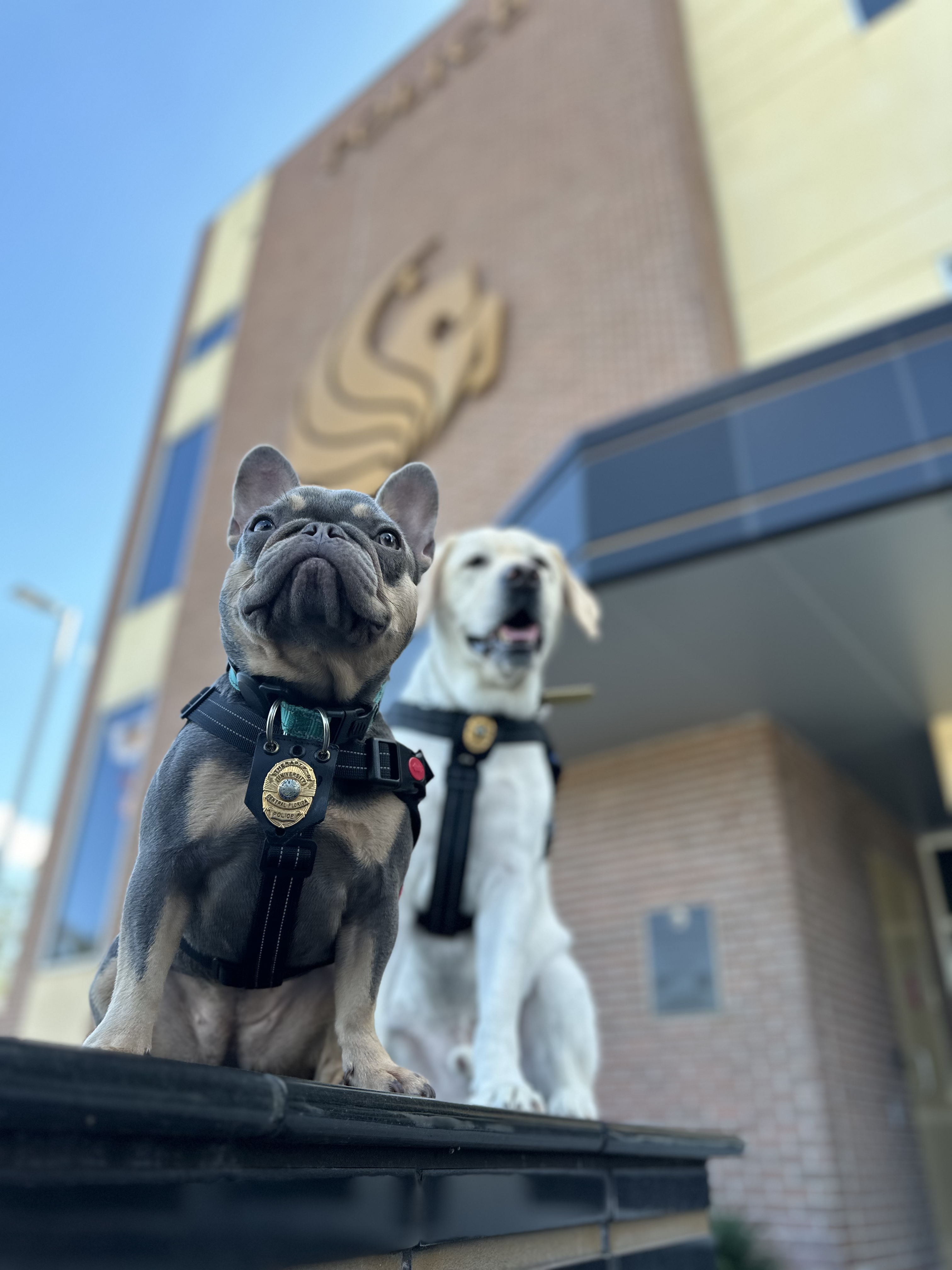
Comments